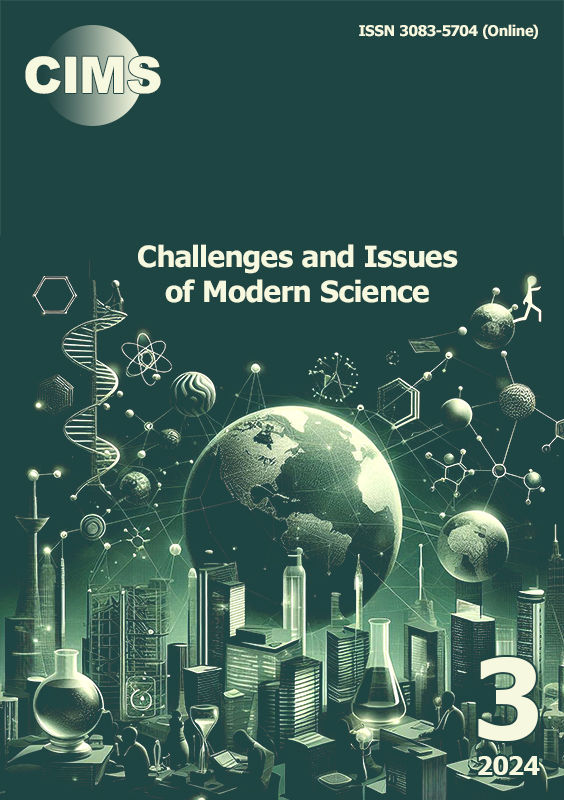Financial and economic consequences of the war for Ukraine
Keywords:
financial and economic consequences, war, infrastructure, business, economic recovery, negative effect, migrationAbstract
Purpose. The article explores the financial and economic consequences of the war with the Russian Federation for Ukraine. The focus is on assessing how businesses, government and other international stakeholders have responded to the various challenges posed by the war. Design / Method / Approach. According to the World Bank’s RDNA3 methodology, damage is the direct costs of destroyed or damaged physical assets and infrastructure, valued in monetary terms. Findings. Businesses note the shortage of labor, rising wages in the market and the overall economic prospects of Ukraine as significant risks to their recovery. They identify the priorities related to government policy and the business ecosystem. Theoretical Implications. Companies demonstrate a cautious view of the country’s economic outlook and prospects, explaining this by the unpredictable situation, insufficient demand, and labor shortages. Most of the companies that have already optimized their staff do not intend to reduce it further, seeing human resources as a prerequisite for a gradual economic recovery. Practical Implications. Most of the Ukrainian companies focus on the domestic market, with a limited presence on foreign markets. They report losses of up to 100 USD thousand. The scale of financial losses varies across sectors, with the construction sector suffering the most and the least, agriculture, telecommunications, marketing, consulting and design services. Originality / Value. Despite unprecedented losses and challenges due to the war, Ukraine has managed to maintain relative macroeconomic and price stability and overcome significant production difficulties and the negative effects of labor outflows and labor migration. Research Limitations / Future Research. Future significant research must be focused on rebuilding a critical infrastructure damaged by the hostilities and enabled a comprehensive reconstruction in Ukraine. Paper Type. Analytical Paper.
Downloads
References
Centre for Economic Recovery (CER) and Advanter Group. (2024). Assessment of the Impact of the War on Micro-, Small-, and Medium-sized Enterprises in Ukraine (pp. 3–29). United Nations Development Programme. https://www.undp.org/ukraine/publications/assessment-wars-impact-micro-small-and-medium-enterprises-ukraine
European Commission. (2023). Questions and Answers – A New Ukraine Facility. European Commission. https://ec.europa.eu/commission/presscorner/detail/en/qanda_23_3353
Government Portal. (2022). Oleksandr Kubrakov appointed Deputy Prime Minister for Restoration of Ukraine – Minister for Communities, Territories and Infrastructure Development of Ukraine. Government Portal. https://www.kmu.gov.ua/en/news/oleksandra-kubrakova-pryznacheno-vitse-premier-ministrom-z-vidnovlennia-ukrainy-ministrom-rozvytku-hromad-terytorii-ta-infrastruktury-ukrainy
Hudoshnyk, O., & Krupskyi, O. (2023). Practices of using Rapid Response Collecting by Ukrainian museums in wartime. Muzeológia a Kultúrne Dedičstvo, 11(2), 5–16. https://doi.org/10.46284/mkd.2023.11.2.1
Kurnosenko, L. (2022). Проблеми та особливості міжнародної фінансової підтримки України в умовах війни. Public administration and regional development, (15), 255-274. https://doi.org/10.34132/pard2022.15.13
Lytvyn, O., Kudin, V., Onyshchenko, A., Nikolaiev, M., & Chaplynska, N. (2024). integration of digital means in the financial sphere: the potential of cloud computing, blockchain, big data and AI. Financial and Credit Activity Problems of Theory and Practice, 1(54), 127–145. https://doi.org/10.55643/fcaptp.1.54.2024.4257
Lytvyn, O., Onyshchenko, A., & Ostapenko, O. (2023). Economic challenges of sustainable development goals in Ukraine. Baltic Journal of Economic Studies, 9(1), 100–112. https://doi.org/10.30525/2256-0742/2023-9-1-100-112
National Bank of Ukraine. (2024). Macroeconomic and Monetary Review. Official website of the National Bank of Ukraine. https://bank.gov.ua/en/news/all/makroekonomichniy-ta-monetarniy-oglyad-jovten-2024-roku
United Nations in Ukraine. (2023). Concept note “Ukraine Community Recovery Fund”. United Nations in Ukraine. https://ukraine.un.org/en/237285-concept-note-ukraine-community-recovery-fund
World Bank. (2023). The World Bank and Ukraine: Laying the Groundwork for Reconstruction in the Midst of War. World Bank Group. https://www.worldbank.org/en/results/2023/11/30/the-world-bank-and-ukraine-laying-the-groundwork-for-reconstruction-in-the-midst-of-war
World Bank. (2024a). Ukraine - Third Rapid Damage and Needs Assessment (RDNA3) : February 2022 - December 2023 (English). World Bank Group. http://documents.worldbank.org/curated/en/099021324115085807/P1801741bea12c012189ca16d95d8c2556a
World Bank. (2024b). Ukraine Relief, Recovery, Reconstruction and Reform Trust Fund (URTF). World Bank Group. https://www.worldbank.org/en/programs/urtf
Близнюк, О. П., & Іванюта, М. О. (2023). Стан та тенденції розвитку фондового ринку України в умовах протистояння викликам війни. In Фінансова архітектоніка та сценарії конкурентних моделей розвитку (pp.19–22). ДБТУ. https://repo.btu.kharkov.ua//handle/123456789/44124
Боровков, Є. Т., & Горох, О. В. (2023). Фінансові механізми забезпечення повоєнного відновлення та конкурентного розвитку економіки. In Фінансова архітектоніка та сценарії конкурентних моделей розвитку (pp. 29–30). ДБТУ. https://repo.btu.kharkov.ua/handle/123456789/44129
Косова, Т. Д., Федосенко, А. Л., & Федосенко, П. Л. (2023). Проблеми розробки і реалізації фінансово-інвестиційної політики в умовах післявоєнного відновлення економіки. In Фінансова архітектоніка та сценарії конкурентних моделей розвитку (pp. 41–44). https://repo.btu.kharkov.ua//handle/123456789/44164
Downloads
Published
Issue
Section
License
Copyright (c) 2024 Olena Lytvyn (Author)

This work is licensed under a Creative Commons Attribution 4.0 International License.
All articles published in the journal Challenges and Issues of Modern Science are licensed under the Creative Commons Attribution 4.0 International (CC BY) license. This means that you are free to:
- Share, copy, and redistribute the article in any medium or format
- Adapt, remix, transform, and build upon the article
as long as you provide appropriate credit to the original work, include the authors' names, article title, journal name, and indicate that the work is licensed under CC BY. Any use of the material should not imply endorsement by the authors or the journal.



















